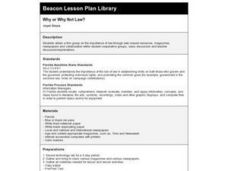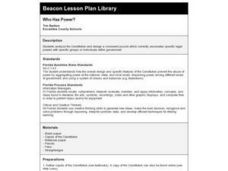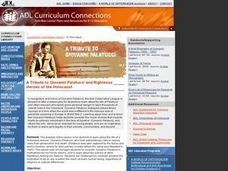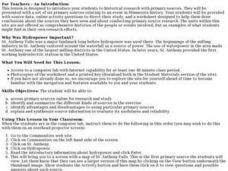Curated OER
Surviving the Depression- 1930-1939 Lesson 3: Solutions to the Depression
Students evaluate the components of the New Deal and role of nonprofit organizations the relief and rebuilding efforts of the Great Depression. They write letters to the organization that they are researching.
Curated OER
Civil Rights and the ADA
Students examine and discuss the 14th and 15th amentments, and evaluate the agendas of Americans from underrepresented groups in the quest for civil rights. They conduct Internet research and create essays or posters regarding Civil Rights.
Curated OER
Private See Dispute
Students use their definition of "reasonable expectations" of privacy with regard to camera cellphones and digital cameras, to draft recommendations to send to Congressional representatives.
Curated OER
Re-Examining Brown
High schoolers identify, research, and report on the people, legal cases and conditions that led to the landmark case, Brown v. Board of Education. They role-play various people from the era preceding 1954.
Curated OER
Riparian: The Guardian of the Waterways
Learners become educated on what a riparian is, the need for riparian, and how a riparian corridor (forest, habitat) can protect waterways. Students construct dioramas depicting riparian habitats.
Curated OER
Who Has Power?
Fourth graders discuss abuse of power in government and examine the Constitution for specific powers in each branch. They create a crossword puzzle utilizing terms and information regarding division of government powers and federalism
Curated OER
A Tribute to Giovanni Palatucci and Righteous Heroes of the Holocaust
Students explore the life of Giovanni Palatucci and other "Righteous Among the Nations". They consider whether the motivation to be an ally is within the reach of every human being. They create a memorial to a hero in their lives.
Curated OER
The Great Debate Lesson Plan: Slavery in the U.S. Constitution
Students examine the U.S. Constitution to see what has been writte about slavery. Then, students, in groups, research the Constitutional Convention of 1787 to explore slavery compromises.
Curated OER
Priorities and Power: Migrants and Voting
Pupils examine the African-American migrants entry into the political process. They summarize their findings in a short essay.
Curated OER
An Introduction:
Students explore historical research with primary sources about Hydropower.
Curated OER
Sectionalism, Popular Sovereignty, and Secession
Students examine sequence of national events that resulted in the Civil War by using primary sources, and creating timelines and maps.
Curated OER
No Vehicles In The Park
Students identify purpose and function of law, discover the intent of lawmakers, and analyze practical applications of a law.
Curated OER
Common Good
Students identify assumptions they may have about government and research to determine whether they are accurate. They support or refute their assumptions in a presentation to the class.
Curated OER
Democracy through Parliamentary Committees / Lessons 2 : Selecting and Studying a Specific Bill
Students appreciate and respect the advantages of Canada's parliamentary system. They engage in a lesson which illustrates the important role committees play in drafting bills.
Curated OER
Democracy through Parliamentary Committees / Lessons 3 : Representation on Parliamentary Committees
Students explore the roles of parliamentarians, witnesses and journalists. They apply the selection criteria used in establishing a parliamentary committee.
Curated OER
So, You Think You Understand Parliamentary Democracy ?
Tenth graders experience first hand the complexity of the political process. They analyze the relationship between party policies and the political spectrum and develop an understanding of how Canada's laws are debated and passed.
Curated OER
Parliamentary Structure and Process on " Deck"
Tenth graders design a "deck" of individual slides on Power Point to synthesize, in a graphic organizer, their recently acquired knowledge of different levels of government in Canada.
Curated OER
Hyperlinking the Hill
Students explain the parts and process of parliamentary democracy. Working students create a word document on the aspect of parliamentary democracy that they have been assigned.
Curated OER
What if the Senate were Reformed on the Triple E Model
Young scholars investigate what the Canadian Senate does and what reform would do to the power relationship between the Prime Minister and the Senate.
Curated OER
Who's Sharing Our Stories on "The Hill"?
Students explore parliamentary structure. They study the roles & responsibility of key players or representatives. This lesson presents a wide variety of rich activities students can engage in to further their understanding of...
Curated OER
Special Parliamentary Committee Simulation
Students see a simulation of how parliamentary committees function.
Curated OER
Bi-Lateral Systems of Government
Students discover how Aboriginal forms of Government can be adapted and how the Navajo's have utilized government.
Curated OER
The Role of the Lobbyist
Students gain knowledge and understanding of the role of a lobbyist. They utilize critical thinking and decision-making skills through the development of a written proposal.
Other popular searches
- Arizona Legislators
- State Legislators
- Write Legislator
- Black Legislators
- County Legislators
- African American Legislators
- Contacting a Legislator
- Black Legislators in Georgia







